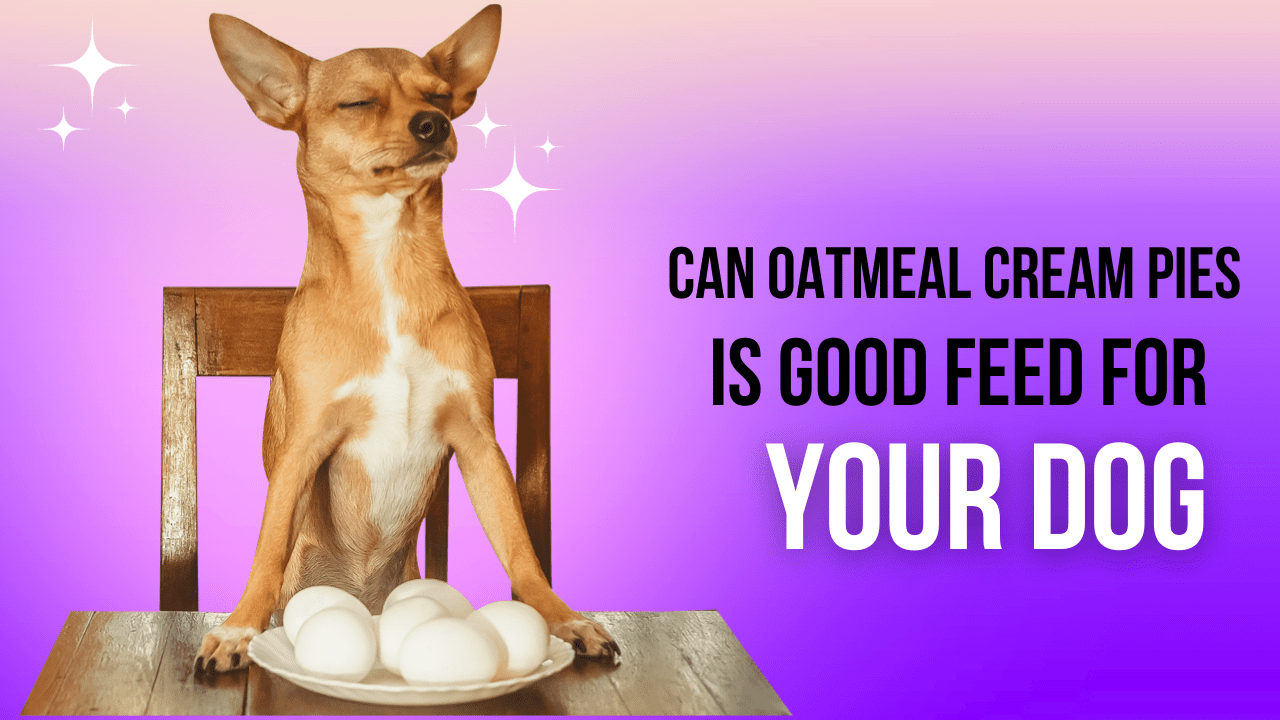In the delightful world of canine confections, we dive deep into the question: Can dogs eat oatmeal cream pie safely? Our journey unfolds with mouthwatering descriptions and then takes a serious turn, exploring the nutritional complexities and potential risks. Along the way, we uncover the delicate balance between indulgence and canine well-being. So, can our furry friends join us in savoring these treats? Let’s find out!

Table of Contents
Setting the stage for a delightful canine culinary adventure
Imagine the joy on your dog’s face as they watch you open that package of oatmeal cream pies. Their wagging tail and hopeful eyes plead for just a taste of that delectable treat.
You can almost hear them saying, “Please, oh please, share this moment of bliss with me!” And who could resist such heartfelt canine persuasion? The aroma fills the air as you break apart one of those delectable oatmeal cookies.
It’s warm and inviting; it entices both human and dog alike. Your loyal four-legged companion is eagerly waiting for their chance to experience the wonders hidden within that unassuming pastry.
Posing the intriguing question: Can dogs eat oatmeal cream pie safely?
This is where our journey takes an unexpected turn. We find ourselves at a crossroads: to allow our furry friends to partake in this gustatory adventure or to deny them their rightful place beside us on this voyage of flavor?
We must consider their health and well-being above all else. The answer to whether dogs can indulge in oatmeal cream pies lies buried beneath layers of nutritional complexities.
While we may be tempted to shower our pets with every indulgence imaginable, we must remember that dogs have different dietary requirements than humans. Their digestive systems, while robust, are not designed to process all of the ingredients commonly found in human food.
So, dear readers, join me as I embark on a quest for knowledge and understanding. Let us explore the nutritional composition of oatmeal cream pies and uncover whether our furry companions can safely partake in this heavenly delight.
The Nutritional Composition of Oatmeal Cream Pies
Unveiling the secrets hidden within these delectable treats
When you sink your teeth into an oatmeal cream pie, dear reader, you are delving into a world of sinful pleasure. These delightful treats consist of two soft and chewy oatmeal cookies sandwiched together with a luscious creamy filling.
But what lies beneath this irresistible exterior? Let me reveal the nutritional composition that both tantalizes our taste buds and potentially harms our beloved furry companions.
First, let’s talk about those heavenly soft oatmeal cookies. Made from a mixture of oats, flour, sugar, butter, and baking soda, these cookies offer a satisfying texture that is both chewy and slightly crispy around the edges.
The oats provide a hearty dose of dietary fiber, which can aid in digestion for us humans. However, for our canine friends with their sensitive digestive systems, too much fiber can lead to unwanted gastrointestinal distress.
The heavenly combination of soft oatmeal cookies and creamy filling
Now let’s delve into the divine core of the oatmeal cream pie – its creamy filling. This velvety concoction is typically composed of hydrogenated vegetable oils (a.k.a., trans fats), high-fructose corn syrup (a notorious villain in the realm of nutrition), artificial flavors to mimic vanilla or creaminess (what happened to using real ingredients?), and preservatives to extend its shelf life (because clearly we all desire stale treats).
While this creamy center may seem like icing on the cake – or shall I say cookie – it poses some serious health risks for our four-legged companions. Dogs are not designed to process high amounts of sugar or artificial additives like we humans can.
These ingredients can lead to weight gain, obesity-related health issues such as diabetes and joint problems in dogs. So as tempting as it may be to share your oatmeal cream pie with your furry friend, it is essential to remember that the nutritional composition of these treats does not align with a balanced canine diet.
It’s time we put an end to the notion that dogs can partake in all our sweet indulgences. Let us prioritize their health and well-being by offering them treats specifically designed for their nutritional needs.
Dogs and Human Food: A Complex Relationship
Exploring the Intricacies of Sharing Human Treats with Our Furry Friends
Ah, the undeniable allure of sharing our delectable human treats with our loyal companions! It tugs at our heartstrings when those pleading puppy eyes fixate upon our every bite, begging for just a taste. But let us not be lured into the trap of sentimentality, my dear reader, for within this seemingly innocent act lies a web of complexity that demands careful consideration.
A Clash of Palates and Digestive Systems
Our canine friends possess a distinct palate and digestive system, crafted over millennia to thrive on a diet tailored specifically to their needs. While we humans may find pleasure in an array of flavors and textures, dogs have different requirements for optimal health.
Their tongues lack the ability to fully appreciate certain tastes such as sweetness, rendering them indifferent to sugary indulgences like oatmeal cream pies. Furthermore, their digestive systems are designed primarily for animal proteins and fats, which differ significantly from the composition of human treats.
The Importance of a Balanced Canine Diet
A balanced canine diet is paramount in ensuring your furry companion’s well-being. Dogs require specific nutrients in precise proportions to maintain optimal health. Deviating from this carefully calibrated balance by introducing excessive amounts of human food can lead to serious consequences.
Essential vitamins and minerals may become deficient if dogs are fed an imbalanced diet rich in overly processed treats meant for human consumption. Such negligence can invite ailments ranging from dull coats and lackluster energy levels to more severe consequences like organ dysfunction or compromised immune systems.
Recognizing Potential Risks Associated with Certain Human Foods
While sharing is undoubtedly an act imbued with love and affection, we must remember that not all human foods are suitable or safe for our canine companions. Understanding the potential risks associated with certain human foods is crucial in preserving their well-being.
Beware of Toxic Culprits
Many seemingly innocuous ingredients commonly found in human treats can prove toxic to dogs. Chocolate, for instance, contains theobromine, a compound that dogs metabolize differently than humans.
Ingesting even small amounts of chocolate can lead to symptoms ranging from vomiting and diarrhea to seizures and cardiac arrhythmias. Similarly, raisins and grapes can cause kidney failure in dogs, while onions and garlic are known to damage red blood cells, potentially leading to anemia.
The Dangers of Excessive Salt and Seasonings
Salt-laden snacks or treats seasoned with spices like onion powder or garlic salt can pose a significant threat to our four-legged friends. Dogs have a lower tolerance for salt compared to humans, making them more susceptible to sodium poisoning if they consume highly salted food items regularly.
Additionally, spices like onion and garlic contain compounds that can irritate a dog’s gastrointestinal tract or disrupt their red blood cell function when ingested in large quantities. While it may be tempting to share every culinary joy with our beloved furry companions, we must approach the subject of feeding them human treats with caution.
Recognizing the intricate dynamics between dogs and human food is essential; understanding their unique dietary requirements is paramount in maintaining their health and happiness. So let us tread carefully through this complex relationship between man’s best friend and our gastronomic indulgences – mindful of both the love we share and the potential hazards we unwittingly expose our faithful friends to
Oatmeal: A Wholesome Ingredient for Dogs?
Unveiling the Nutritional Benefits of Oatmeal for Canines
Ah, oatmeal! The humble grain that has sustained humanity for centuries.
And now, we question whether it can play a role in our furry friends’ diets. I say, without a shadow of doubt, yes!
Oatmeal is indeed a wholesome ingredient for dogs, bringing with it an array of nutritional benefits that can enhance their overall well-being. First and foremost, let’s talk about fiber—the unsung hero of good digestion.
Oatmeal is abundant in this indigestible wonder that keeps our dogs’ bowels moving like clockwork. Just imagine your canine companion prancing around the park with a spring in their step and not a care in the world because of their optimal bowel regularity.
Say goodbye to those dreaded bouts of constipation or diarrhea; oatmeal’s fiber content ensures a healthy gastrointestinal tract. But that’s not all!
Oatmeal also serves as an excellent source of carbohydrates—an essential component that fuels our pets’ energetic endeavors. Whether they’re bounding through fields or chasing their tails with unmatched enthusiasm, our canine pals need ample energy to keep up with their zestful lives.
And where better to find this energy than in the comforting embrace of oats? So let us celebrate the wonders of oatmeal and embrace its inclusion in our dogs’ diets—a nourishing addition that enhances digestion and provides them with vital energy reserves.
Cream Filling: Friend or Foe?
The Hidden Hazards Lurking Within Cream Fillings
Ah, the alluring cream filling! The epitome of indulgence nestled between two luscious oatmeal cookies.
But while it may awaken our taste buds and send us into a state of euphoria, we must not forget that our beloved canine companions have vastly different dietary needs. Dogs, my dear readers, are not designed to handle the temptations of cream fillings in oatmeal pies.
Let us first tackle the issue of high sugar content. Now, I implore you to imagine a blissful moment where your dog takes a bite of that decadent oatmeal cream pie, only to realize its detrimental consequences.
Excessive sugar intake in dogs can lead to weight gain and obesity-related health issues that can shorten their precious lives. Do we really want to subject our faithful companions to such misery for the sake of a fleeting moment of gustatory pleasure?
The Perils of Artificial Additives
Artificial additives, dear readers, are nothing short of insidious villains lurking within these innocent-looking cream fillings. These impostors claim to enhance flavor and prolong shelf life but come at an alarming cost. Canines are particularly susceptible to the adverse effects caused by artificial additives such as preservatives and food colorings.
Allow me to paint you a picture: your unsuspecting dog devours an oatmeal cream pie laced with these harmful substances, blissfully unaware of the ticking time bomb within. Gradually but surely, their delicate systems become subjected to potential allergic reactions and gastrointestinal distress triggered by these artificial concoctions meant for human consumption alone.
Is it fair, I ask you? Is it moral for us humans to expose our loyal four-legged friends to such perilous substances in the guise of a simple treat?
Moderation is Key: Guidelines for Treating Your Dog with Oatmeal Cream Pies
Creating Boundaries to Ensure Your Dog’s Well-being While Indulging Their Taste Buds
Ah, the delicate balance between spoiling our beloved dogs and ensuring their overall health. When it comes to treating your furry friend with oatmeal cream pies, establishing clear boundaries is crucial.
Remember, moderation is the magical word here. While it’s tempting to shower your pup with an unlimited supply of these delectable treats, restraint must be exercised.
One way to create boundaries is by allocating a specific “treat time” during the day when your canine companion can savor a small piece of oatmeal cream pie. By setting boundaries around treat consumption, you prevent overindulgence and potential health issues that may arise from excessive sugar and additives within the cream filling.
Consulting with Your Veterinarian Before Introducing Any New Food into Your Dog’s Diet
Before embarking on any culinary adventure involving our four-legged friends, consulting with a trusted veterinarian is non-negotiable. These knowledgeable professionals possess the expertise to provide tailored advice regarding your dog’s dietary needs.
Inquiring about the safety of feeding oatmeal cream pie to your canine companion? Veterinary experts can play a pivotal role in helping you make informed decisions. They will guide you in assessing whether oatmeal cream pies are a suitable addition to your dog’s diet or if exploring alternative options is advisable. By seeking professional guidance, you ensure that any new food introduced aligns with your dog’s unique nutritional requirements and potential health concerns.
Remember, not all dogs are created equal when it comes to tolerating certain foods. Consulting your vet offers peace of mind and allows for informed decision-making in treating your furry companion.
Conclusion:
While oatmeal cream pies may tempt both human palates and canine taste buds alike, caution must prevail. Moderation coupled with consultation from a trusted veterinarian forms the cornerstone of responsible treat-giving. By creating boundaries and seeking expert advice, you can strike a balance between indulgence and your dog’s overall well-being.
Remember, a happy dog is one that can enjoy occasional treats in a safe and controlled manner. So go ahead, treat your four-legged friend to the wonders of an oatmeal cream pie, savor the moment together, and delight in the joy it brings to both of you – within reason, of course!
Our Recommendations
Certainly, here’s the table without additional content:
| Component | Safety for Dogs |
|---|---|
| Oatmeal | Generally safe in small amounts. |
| Cream Filling | Not recommended due to high sugar content and potential digestive upset. |
| Artificial Additives | Some oatmeal cream pies may contain additives or ingredients harmful to dogs. |
| Occasional Treat | Fine for an occasional small bite, but not a suitable regular treat. |
| Consult Veterinarian | Always consult with a veterinarian before sharing human foods with your dog. |
While the occasional small bite of an oatmeal cream pie is unlikely to harm most dogs, it’s not an ideal treat for them. Oatmeal on its own is generally safe for dogs in small quantities, but the cream filling is typically high in sugar and could lead to digestive upset or contribute to obesity if consumed regularly. Additionally, some oatmeal cream pies may contain artificial additives or ingredients that are not suitable for canine consumption. It’s always best to stick to dog-safe treats and consult with your veterinarian regarding any human foods you’re considering sharing with your dog to ensure they stay healthy and happy.




